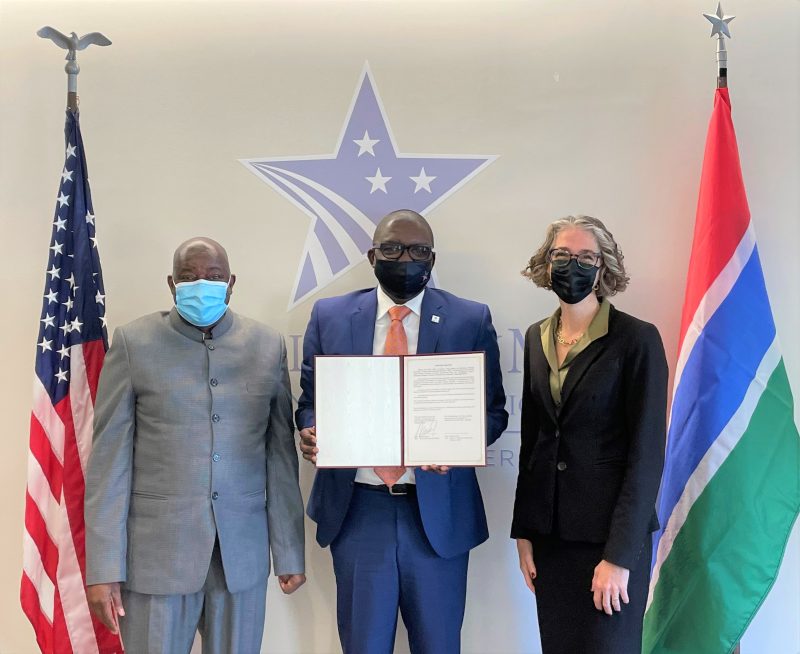
The Gambia Ambassador to the United States Dawda Docka Fadera (left), MCC's Acting CEO Mahmoud Bah (middle), and MCC's Vice President of Department of Policy and Evaluation Alicia Phillips Mandaville pose for a photo following a signing ceremony for the $25 million MCC-The Gambia Threshold Program.
The grant program will support The Gambia’s efforts to achieve universal energy access by 2025, prioritizing imports and renewable energy sources – especially domestic solar generation – to help the country meet its Nationally Determined Contributions to curb greenhouse gases.
MCC’s Acting Chief Executive Officer Mahmoud Bah and The Gambia’s Minister of Finance and Economic Affairs Mambury Njie presided over the virtual ceremony and celebrated the positive impact this grant program will have on reducing poverty and promoting sustainable economic growth by building a climate-resilient electricity sector.
“Today, we are partnering with The Gambia to lay the foundation for a just transition to more reliable and clean sources of electricity,” said Bah. “An efficient energy sector in The Gambia means increased productivity such as safe vaccine storage, access to late night learning for young students, efficient manufacturing processes for goods and services – ultimately growing The Gambian economy. I am excited for what this grant means for the people of The Gambia and the long-term change it can bring to their everyday lives”
Joint analysis conducted by the Government of The Gambia and MCC found that frequent power outages result in high economic and environmental costs in the form of lost productivity, equipment damage, produce spoilage, and the reliance on fossil fuels for backup generators. MCC’s partnership with the Government of The Gambia will reduce the frequency and duration of outages by improving the governance and operational management of the national electricity utility.
“We are delighted to announce this milestone for the MCC threshold program,” said Richard C. Paschall, Ambassador of the United States to the Republic of The Gambia. “It is a significant part of the $50 million investment the U.S government is making to further our objective of building capacity and the resources to manage The Gambia’s economy and support growth that furthers the wellbeing of Gambian citizens.”
MCC and Africa Energy Programs
MCC has invested in seven energy programs in West Africa, including a $550 million Power Compact with Senegal – which began implementation in September 2021 – and the $450 million Burkina Faso Compact, signed in August 2020.
The Senegal Power Compact consists of three projects that take a complementary approach to improving the power sector: improving the transmission network to meet the growing demand on the interconnected network in Senegal, increasing electricity access in rural and peri-urban areas of the south and central regions, and improving the overall governance and financial viability of the sector. The Burkina Faso Compact is addressing economic constraints through three projects that will alleviate the poor condition of the country’s energy infrastructure, as well as address the insufficient generation capacity and an over-reliance on thermal energy.
MCC also signed a Memorandum of Understanding (MOU) with Burkina Faso and Cote d’Ivoire in June 2021, as well as a cooperative agreement with the West African Power Pool (WAPP), as part of a potential regional energy interconnection program between Burkina Faso and Côte d’Ivoire.
MCC’s threshold programs are smaller-scale grants awarded to countries that are committed to improving policy performance through policy reform and strengthened institutional capacity. MCC has signed 29 threshold programs totaling roughly $640 million since its inception, and is currently developing programs Kenya, Kiribati, and the Solomon Islands.
The Millennium Challenge Corporation is an independent U.S. Government agency working to reduce global poverty through economic growth. Created in 2004, MCC provides time-limited grants and assistance to countries that meet rigorous standards for good governance, fighting corruption and respecting democratic rights.

